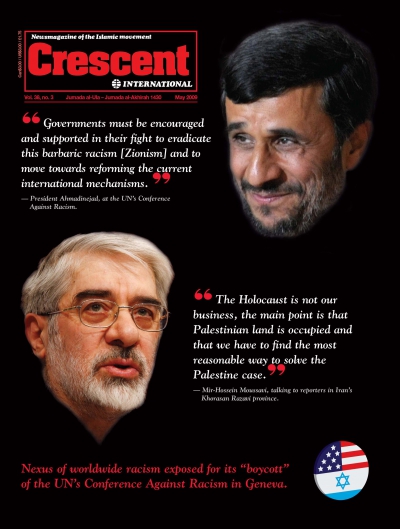Crescent International Vol. 38, No. 3
Newsmagazine of the Islamic movement
Zafar Bangash, Afeef Khan, Muhammad H. al-'Asi
Jumada' al-Ula', 1430 2009-05


By staging a walk out while President Mahmoud Ahmedinejad of Iran was addressing the UN anti-racism conference in Geneva on April 20, the European countries have exposed their own racism without affecting the ultimate outcome of the meeting. Representatives from a tiny minority of European countries that have a chequered history regarding human rights are all former colonialists who have perpetrated horrible crimes during the colonial era.

In the introduction to his 1985 book, Of Emperors and Pirates, the American professor, Noam Chomsky quotes St. Augustine narrating a dialogue between Alexander the Great and a pirate. “How dare you molest the seas?” demands Alexander. “How dare you molest the world?” replies the pirate. “Just because I do it with a little boat, I am called a pirate and you do it with a huge ship and you are called an emperor!”

Since the announcement on April 8 that Egyptian authorities had arrested 49 members of a “Hizbullah cell” in the country, we have been subjected to a variety of explanations for the arrests and several different accounts of exactly what happened, when it happened, and why it happened. Much of this information has been leaked by Egyptian authorities, and little of it has survived critical scrutiny.

The West has a peculiar attitude to global problems. In addition to its favourite bogey—war on terror—there is much talk about human rights, respect for the rule of law, the will of the “international community” and fighting racism yet it remains in denial about its own misdeeds.

The Islamic Republic of Iran, government and people, are gearing up for presidential elections that are scheduled for the first half of June 2009. There appear to be two prime candidates for the presidency: Mr. Mahmoud Ahmedinejad and Mr. Mir HosseinMoussavi. Both fine men are qualified beyond doubt to lead the Islamic Republic of Iran and the Islamic Movement of the world during the coming four-year term, which will probably be the most challenging time in the history of the Islamic Movement and state.

Question: What does a great power do when it suffers an unexpected defeat and a major setback in its plans for achieving an acceptable solution to a problem? Answer: It sits back, regroups, deflects public attention to other issues, and works quietly behind the scenes to prepare the ground for a new attempt to achieve its objectives by some other strategy in future.

Three more Israeli spy rings were uncovered in Lebanon leading to the arrest of several persons last month bringing the total to nine arrests over the year. Three persons—two Lebanese and one Palestinian—were arrested on April 25. The Lebanese were identified as Ali Mantash and Robert Kfoury, and the Palestinian as Mohammad Awad.

One of the first acts of Barack Obama as president of the United States was to order a review of all Guantanamo Bay detainees. He also announced that the notorious detention camp will be closed in a year. That, however, has not deterred guards at the prison from abusing detainees, as Mohammad al-Gharani revealed in a telephone interview posted on Al-Jazeeratelevision website on April 14.

Like the chicken and egg question, what came first: the torturers or torture memos? Despite the mounting evidence, for years, officials in the Bush administration brazenly maintained: “TheUnited States does not do torture.” This was not stated merely by low level officials. Starting from former US President George Bush down, everyone had memorized this mantra about torture.

The minority Conservative government of Canada appears determined to deny Omar Khadr his Charter Rights even in the face of several court rulings, the latest of which was handed down on April 23. Justice James O’Reilly of the Federal Court issued a clear ruling ordering Canada to seek Khadr’s repatriation from Guantanamo Bay where he has languished since October 2002.

This month, the world may witness the final chapter in the 25-year-old conflict between the Sri Lankan army and the Liberation Tigers of Tamil Eelam (LTTE), commonly known as the Tamil Tigers. The civil war, which has killed more than 70,000 people and displaced hundreds of thousands others, was triggered by Tamil demands for an independent homeland in the North and East of the country following decades of complaints about discrimination against them by the majority Buddhist Sinhalese government.

The Taliban’s ascendance in Swat and their brief foray into the town of Buner to the south sent leaders of the self-proclaimed superpower in Washington into panic that surpassed even that displayed by officials in Islamabad. US media reports repeatedly mentioned that Swat is barely 100 kilometres from the Pakistani capital.

We have gathered here in the follow up to the Durban conference against racism and racial discrimination to work out practical mechanisms for our holy and humanitarian mission. Over the last centuries, humanity has gone through tremendous suffering and pain. In the Middle Ages, thinkers and scientists were sentenced to death.

There is also another definition of the Ummah: that of the aggregate power of the political culture of Islam. Today this is virtually non-existent because Muslims are not in control of their destiny. At this level, we cannot speak of the Muslim Ummah per se because its power is fragmented into nation-states ruled by elites and political systems that are the product of colonialism.
